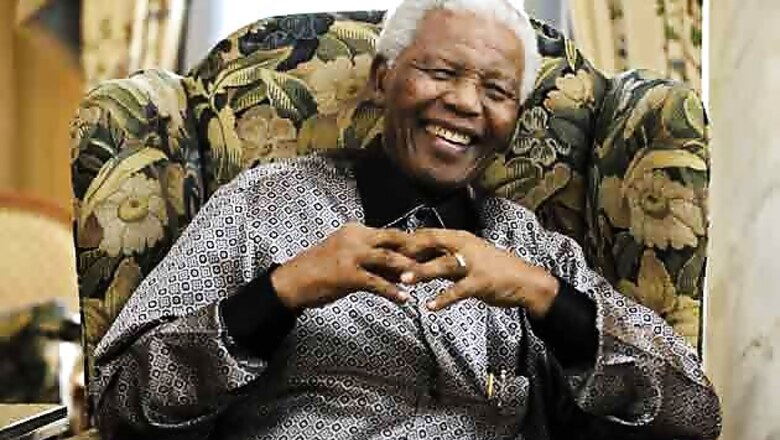
views
Cape Town: US President Barack Obama and his family visited South Africa's bleak former prison of Robben Island on Sunday to pay tribute to ex-inmate Nelson Mandela, now critically ill in hospital. Obama was expected to later cite the legacy of Mandela, who was imprisoned on the windswept island for most of the 27 years he spent in jail before becoming the country's first black president, in a speech at the University of Cape Town.
Current South African President Jacob Zuma was also held at the notorious jail off Cape Town's coast under the apartheid regime, which ended in 1994 with Mandela's election victory. In sunny weather, the US president flew by helicopter with his family to the island, which is surrounded by the frigid, shark-infested waters of the South Atlantic.
His party drove a short distance to the former prison's lime quarry, where Mandela and other prisoners toiled for years. Their guide, 83-year-old former inmate and anti-apartheid activist Ahmed Kathrada, spoke about his time there with Mandela and other African National Congress prisoners.
Obama told his daughters the idea of non-violent resistance, an important tactic in the U.S. civil rights movement, had taken root in South Africa where its chief proponent Mahatma Gandhi worked as a lawyer before returning to India.
HERO
On Robben Island, Obama also again visited Mandela's cell, repeating a previous visit he made as a US senator in 2006. After touring the former prison, Obama and his wife Michelle signed a guest book in which Obama wrote: "On behalf of our family we're deeply humbled to stand where men of such courage faced down injustice and refused to yield.
"The world is grateful for the heroes of Robben Island, who remind us that no shackles or cells can match the strength of the human spirit." The 94-year-old Mandela's struggle with a lung infection has been a somber backdrop to Obama's eight-day Africa trip. South Africa says his condition is "critical but stable".
Obama met Mandela's relatives in Johannesburg on Saturday to deliver a message of support instead of directly visiting the frail former president at the hospital where he has spent the last three weeks. The US leader describes Mandela as a "personal hero", and has reminded audiences in Africa that his first political activism was to urge his U.S. college to divest itself of South African investments to protest against apartheid.
In his speech at the university, Obama was expected to look back to an address US Senator Robert Kennedy gave in Cape Town in 1966 comparing the struggle to overcome apartheid with the U.S. civil rights movement. Some protesters gathered outside the University of Cape Town ahead of Obama's speech, holding placards attacking US foreign policy reading "Obama mass killer" and "End drone wars now".
POVERTY AND CORRUPTION
Obama, the first African American president, is expected to remind a young audience at the university that Mandela and the US civil rights movement persevered against daunting obstacles in bringing social change that many thought impossible. The US president will then challenge his audience not to be content with progress so far but to push ahead with battles to lift Africans out of poverty, combat government corruption and improve health and living standards across the continent.
He will also aim to restore some of the luster of the US relationship with Africa by stressing the U.S. desire to move beyond being an aid donor toward greater economic partnerships. The speech comes in the middle of an Africa trip taking Obama to Senegal, South Africa and Tanzania.
Obama has sought to use the trip to emphasize Africa's potential as a business partner for the United States and to overcome the perception that he has ignored the continent. Many Africans are disappointed that despite the US president's Kenyan ancestry, his only previous visit to the continent while in office was to Ghana in 2009.
In his speech, the president will unveil a $7 billion US initiative to double access to electric power on a continent where only one in three people have electricity. While in Cape Town, Obama will also visit a health centre to highlight U.S. efforts to combat HIV/AIDS on the continent, which have contributed to a 32 percent drop in the number of AIDS-related deaths in Sub-Saharan Africa from 2005 to 2011.

















Comments
0 comment